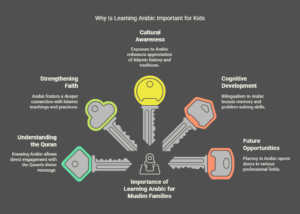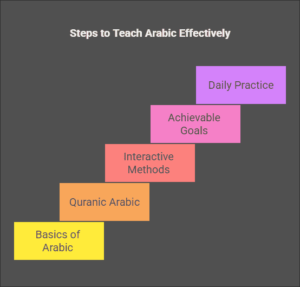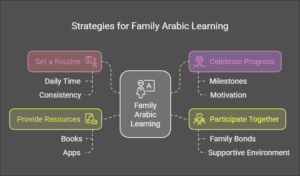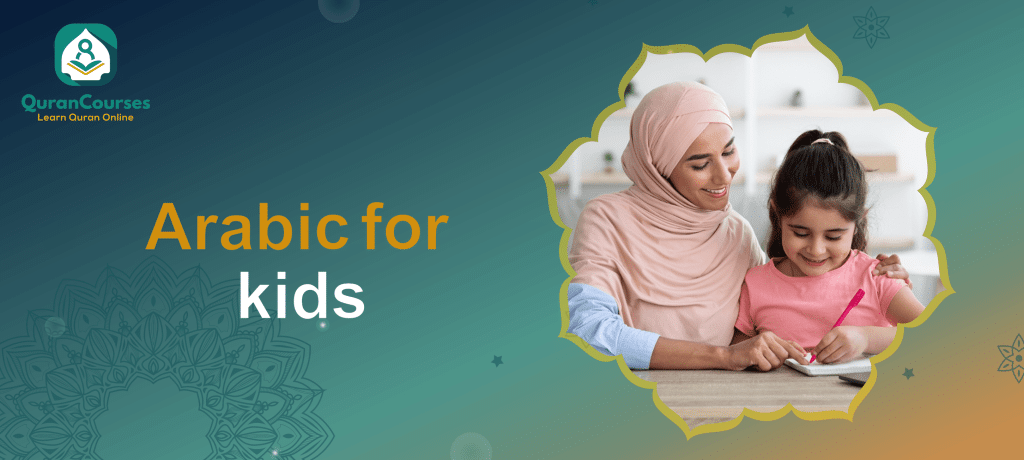Learning Arabic is more than just acquiring a new language; it’s about connecting with a rich cultural heritage, fostering a love for Islam, and strengthening ties to the Quran. For kids, starting Arabic lessons at an early age can have lifelong benefits. From cognitive development to spiritual growth, Arabic opens doors to new opportunities, both in this world and in the hereafter.
This guide will help you navigate the journey of teaching your children Arabic, highlighting effective strategies, key benefits, and how to choose the best resources for learning.
Why Is Learning Arabic Important for Kids?

Arabic is the fifth most spoken language in the world, with over 400 million speakers and deep historical and religious significance. But for Muslim families, the importance of learning Arabic goes beyond just communication:
- Understanding the Quran
Arabic is the language of the Quran, and knowing it allows children to grasp the divine message directly, without relying on translations. - Strengthening Faith
Learning Arabic fosters a deeper connection with Islamic teachings, making prayers and Quranic recitation more meaningful. - Cultural Awareness
Children exposed to Arabic gain a better appreciation of Islamic history, culture, and traditions. - Cognitive Development
Studies show that bilingual children often have stronger memory, problem-solving, and multitasking skills. - Future Opportunities
Arabic fluency can pave the way for translation, diplomacy, international relations, or academic careers.
How to Teach Arabic to Kids: A Step-by-Step Approach

1. Create a Strong Foundation
Start with the basics, like the Arabic alphabet and phonics. Ensure your child can recognize, pronounce, and write the letters before moving to words and sentences.
- Tools: Alphabet songs, flashcards, and writing practice sheets.
- Tip: Use apps and videos to make the learning process engaging and interactive.
2. Introduce Quranic Arabic
Once your child understands the basics, incorporate simple Quranic verses. This connects them to their faith while improving their vocabulary and comprehension.
- Tip: Start with short surahs like Al-Fatihah or Al-Ikhlas.
3. Use Fun and Interactive Learning Methods
Children learn best through play and hands-on activities. Make Arabic learning enjoyable by using:
- Games: Arabic word puzzles, memory games, and matching activities.
- Stories: Islamic stories in Arabic to help with vocabulary and moral lessons.
- Songs: Arabic nursery rhymes to improve pronunciation.
4. Set Small, Achievable Goals
To avoid overwhelming your child, break lessons into manageable segments and focus on one topic at a time, such as numbers, colors, or animals in Arabic.
5. Incorporate Daily Practice
Repetition and consistency are key. Integrate Arabic into daily life by:
- Labeling household items with their Arabic names.
- Using Arabic phrases during meals, playtime, or bedtime.
Choosing the Right Arabic Classes for Kids
Selecting the right program is crucial to ensuring your child’s success. Here’s what to look for:
1. Qualified Instructors
Choose programs with native Arabic-speaking teachers who are experienced in teaching children. These teachers should be patient, encouraging, and skilled at making lessons fun.
2. Age-Appropriate Curriculum
The program should cater to your child’s age and learning level, gradually progressing from basic to advanced topics.
3. Interactive Platforms
Look for classes that use engaging tools like videos, animations, and games to keep your child motivated.
4. Flexibility
Busy schedules require adaptable programs. Opt for online classes that offer flexible timings and personalized lessons.
5. Safety and Accessibility
Ensure the platform is secure and easy to use, with live sessions conducted in a monitored environment.
Why Our Online Arabic Classes Are Perfect for Kids
At The Quran Courses Academy, we specialize in teaching Arabic to kids through a fun, structured, and faith-centered approach. Here’s why parents worldwide trust us:
1. Qualified, Native Teachers
Our tutors are not only fluent in Arabic but are also trained to teach children with patience and creativity.
2. Customized Lessons
We design personalized lesson plans tailored to each child’s pace and learning goals.
3. Engaging Content
Our curriculum includes:
- Alphabet and phonics.
- Vocabulary building through games and storytelling.
- Quranic Arabic and Tajweed rules.
4. Free Trial Classes
Experience our teaching methods risk-free with two complimentary trial classes.
5. Global Accessibility
Our online platform reaches families in the USA, UK, Canada, Australia, and beyond, ensuring every child has access to quality education.
Benefits of Learning Arabic with Us
- Faith Connection: Kids learn Quranic Arabic alongside the language, enhancing their spiritual growth.
- Boosted Confidence: As children improve their skills, they gain confidence in reciting the Quran and speaking Arabic.
- Cognitive Growth: Our interactive methods stimulate memory, focus, and critical thinking.
- Cultural Enrichment: Lessons are infused with stories and teachings from Islamic history, enriching your child’s understanding of their heritage.
Tips for Parents to Support Their Child’s Learning

- Set a Routine: Dedicate a specific time each day to Arabic practice.
- Celebrate Progress: Acknowledge milestones to keep your child motivated.
- Participate Together: Learning Arabic as a family can strengthen bonds and create a supportive environment.
- Provide Resources: Invest in Arabic books, flashcards, and apps to supplement classes.
Also Read: What Kids Learn in Online Arabic Classes
FAQs about Learn Arabic for Kids
1. What age should my child start learning Arabic?
Children as young as 4 can start with basic letters and sounds. Early exposure helps them grasp the language more easily later.
2. Do you teach conversational Arabic or Quranic Arabic?
We teach both! Our curriculum balances everyday Arabic with Quranic studies to give children comprehensive knowledge.
3. Can my child learn Arabic if they’ve never studied it?
Absolutely. Our beginner-friendly program starts from scratch, making it suitable for kids with no prior exposure.
4. How often should my child take classes?
We recommend at least 2-3 weekly sessions, supplemented by daily practice at home.
Start Your Child’s Arabic Journey Today!
Learning Arabic is a priceless gift that connects children to their faith, heritage, and the wider world. At The Quran Courses Academy, we are committed to providing a supportive, engaging, and effective learning experience for kids everywhere.
📚 Enroll now to claim your free trial classes and watch your child thrive in Arabic learning! Together, we’ll pave the way for a brighter, more connected future.



